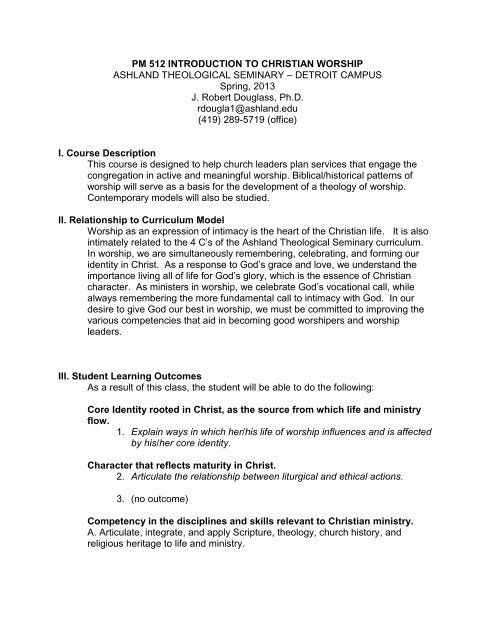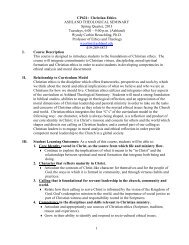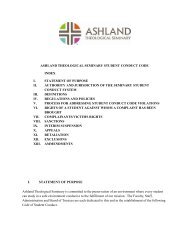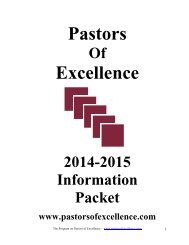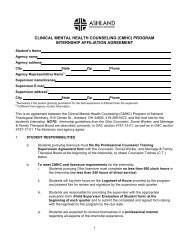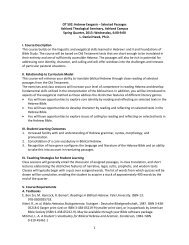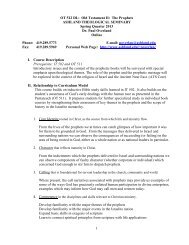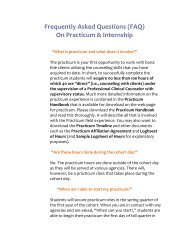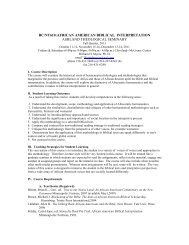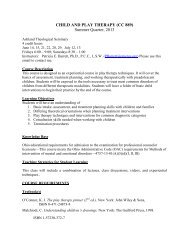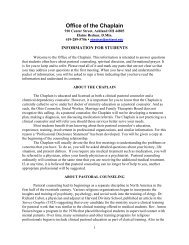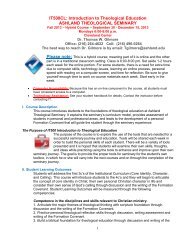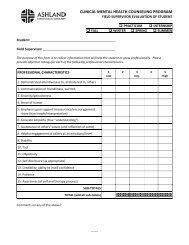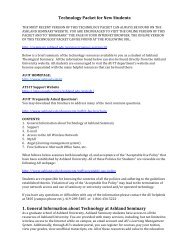PM 512 INTRODUCTION TO CHRISTIAN WORSHIP ASHLAND ...
PM 512 INTRODUCTION TO CHRISTIAN WORSHIP ASHLAND ...
PM 512 INTRODUCTION TO CHRISTIAN WORSHIP ASHLAND ...
Create successful ePaper yourself
Turn your PDF publications into a flip-book with our unique Google optimized e-Paper software.
<strong>PM</strong> <strong>512</strong> <strong>INTRODUCTION</strong> <strong>TO</strong> <strong>CHRISTIAN</strong> <strong>WORSHIP</strong><br />
<strong>ASHLAND</strong> THEOLOGICAL SEMINARY – DETROIT CAMPUS<br />
Spring, 2013<br />
J. Robert Douglass, Ph.D.<br />
rdougla1@ashland.edu<br />
(419) 289-5719 (office)<br />
I. Course Description<br />
This course is designed to help church leaders plan services that engage the<br />
congregation in active and meaningful worship. Biblical/historical patterns of<br />
worship will serve as a basis for the development of a theology of worship.<br />
Contemporary models will also be studied.<br />
II. Relationship to Curriculum Model<br />
Worship as an expression of intimacy is the heart of the Christian life. It is also<br />
intimately related to the 4 C’s of the Ashland Theological Seminary curriculum.<br />
In worship, we are simultaneously remembering, celebrating, and forming our<br />
identity in Christ. As a response to God’s grace and love, we understand the<br />
importance living all of life for God’s glory, which is the essence of Christian<br />
character. As ministers in worship, we celebrate God’s vocational call, while<br />
always remembering the more fundamental call to intimacy with God. In our<br />
desire to give God our best in worship, we must be committed to improving the<br />
various competencies that aid in becoming good worshipers and worship<br />
leaders.<br />
III. Student Learning Outcomes<br />
As a result of this class, the student will be able to do the following:<br />
Core Identity rooted in Christ, as the source from which life and ministry<br />
flow.<br />
1. Explain ways in which her/his life of worship influences and is affected<br />
by his/her core identity.<br />
Character that reflects maturity in Christ.<br />
2. Articulate the relationship between liturgical and ethical actions.<br />
3. (no outcome)<br />
Competency in the disciplines and skills relevant to Christian ministry.<br />
A. Articulate, integrate, and apply Scripture, theology, church history, and<br />
religious heritage to life and ministry.
4. Discuss the various means by which Christians have expressed<br />
worship throughout history.<br />
5. Articulate the beginnings of a theology of worship that includes a<br />
consideration of the ways in which worship contributes to the<br />
formation of authentic community.<br />
6. Analyze the strengths and limitations of his/her own liturgical tradition.<br />
B. Apply cultural exegesis to one’s life and ministry.<br />
7. Express an awareness of and appreciation for worship beyond her/his<br />
particular tradition and culture.<br />
C. Practice a broad range of appropriate ministry skills.<br />
8. Demonstrate an emerging ability to design and lead a purposeful<br />
worship service.<br />
IV. Teaching Strategies for Student Learning<br />
This class will include a combination of lectures, class discussions, small group<br />
discussions, and group projects.<br />
V. Course Requirements<br />
A. Textbooks<br />
Constance Cherry, The Woship Archtect. Baker Academic, 2010. ISBN:<br />
080103874X<br />
Pedrito U. Maynard-Reid, Diverse Worship: African-American, Caribbean, &<br />
Hispanic Perspectives, Downers Grove: InterVarsity Press, 2000. ISBN:<br />
0830815791.<br />
Rory Noland, The Heart of the Artist: A Character Building Guide for You and<br />
Your Ministry Team, Grand Rapids: Zondervan Publishing, 1999.<br />
ISBN: 0310224713<br />
Robert E. Webber, Ancient-Future Worship: Proclaiming and Enacting God's<br />
Narrative. Baker, 2008. ISBN: 0801066247<br />
B. Attendance<br />
According to the student handbook, attendance at all class sessions is expected<br />
unless the professor has been notified in advance. A student missing the<br />
equivalent of 1.5 hours of lecture will have additional work to complete. Any<br />
student missing the equivalent of six class hours (any combination of lecture and
group time) will be required to receive a lower grade or withdraw from the class;<br />
this is at the discretion of the professor. This includes tardiness to class.<br />
C. Assignments/Assessment of Student Learning<br />
1. Worship Attendance and Evaluation (15% of grade)<br />
A. Attendance at a Christian worship service different from your own<br />
(cross-culturally)<br />
B. Evaluation of Two Different Worship Services.<br />
- one should be the student’s “home” church<br />
- one should be the service described in #1 above.<br />
C. Write a 3-4 page reflection paper where you 1) briefly describe the<br />
settings and services (1 paragraph per service), 2) compare the<br />
services (how were they similar), 3) contrast the services (how were<br />
they different), and 4) briefly explain which you liked better and why.<br />
This can be submitted any time during the quarter but will not be received after<br />
June 5, 2013.<br />
2. Group Work (30% of final grade)<br />
A. Design and lead 2 worship services. (20%)<br />
These services will be designed and led by in-class groups.<br />
Each group will plan and lead two 10-20 minute worship segments. This is<br />
an opportunity for students to explore unfamiliar styles and elements of<br />
worship. Your grade for this will be part of your group grade. Additional<br />
information will be provided during the first class.<br />
B. Actively participate in all other group work. (10%)<br />
3. Terms and Concepts Exam (20% of grade)<br />
There will be an objective exam covering the entire course through November.<br />
The tested material will come from class lectures and readings. It is will be taken<br />
online and will be completed by June 5, 2013.<br />
4. Words of Transition (5% of grade)<br />
One of the easiest ways to enhance the flow of worship is through<br />
appropriate words of transition. Students will take a familiar order of<br />
worship and compose 5 statements that will assist in the flow of the<br />
service. More details will be given the first day of class. Due April 10, 2013.
5. Final Paper (30%) Due June 5, 2013.<br />
Final Paper Guidelines and Potential Topics: 10 pages<br />
The cumulative input from class interaction and outside reading is to be distilled into a minimum<br />
10, but no more than 15-page final paper (not counting front/back matter such as title page,<br />
bibliography, appendices, etc.), with a minimum of ten significant bibliographical sources. The<br />
student is permitted to follow one of the two courses listed below, based on interest. (See<br />
grading rubric for final paper in a separate document). Time will be given to discussing and<br />
refining your decision in class so that it is neither too broad nor too narrow for a research paper<br />
of this length.<br />
Option 1:<br />
An in-depth look at the student’s own local worshiping community. This study should<br />
draw from the materials introduced in class and observable data from the practices of<br />
the local church. The paper will consist of four parts:<br />
1) A description of the local congregation, including its perceived theology of worship<br />
(what does its behavior tell us about its beliefs). (2 pages).<br />
2) A summary of the place this congregation takes in the overall history of worship<br />
praxis (free worship/liturgical, importance of sacraments, etc.). In other words,<br />
trace the lineage of this congregation’s worship and place it in an historical context.<br />
(3-5 pages).<br />
3) An analysis, based on the student’s study and observation, of his/her worshiping<br />
congregation’s strengths and weaknesses. While the focus should be on the main<br />
weekly worship gathering, the entire life of the church in worship may also be<br />
discussed. (3-5 pages).<br />
4) A concluding section of steps the church’s worship leadership can take to<br />
strengthen areas that are already healthy and to make corrections in areas that are<br />
not. Attention should be given to broader, more “macro” issues that need to be<br />
resolved over an extended time and not peripheral or technical items that can be<br />
easily addressed. (2-3 pages).<br />
Option 2:<br />
A research paper into a specific worship topic. This is a means for the student to<br />
explore a particular area of academic interest and become more familiar with the leading<br />
voices and issues involved. Although this is not the same kind of local church-focused<br />
review as option A above, it should eventually result in describing how it relates to the<br />
student’s own particular worship community. Some suggestions for topics include:<br />
Use of the Christian calendar in worship planning; the place of sacraments in<br />
worship; historic controversies regarding the sacraments; how we are “formed” in<br />
worship; the role of music and/or the arts in worship; the benefits and problems of<br />
technology in worship; postmodern worship; Trinitarian worship; how our worship<br />
reflects our Christology, Missiology, Pneumatology, Ecclesiology, Eschatology, etc.<br />
(select 2-3); Wesley and worship; worship as adoration and action; present a topic to<br />
the instructor for consideration.<br />
The paper should consist of three parts:
1) An introduction to the topic with an indication as to why this is of unique interest to<br />
you. If it is to address a particular issue in your local worshiping body, give<br />
reasons. (1-2 pages)<br />
2) An exploration into the subject itself, identifying key issues in history, significant<br />
writers/thinkers who have addressed the topic, and other relevant findings. (7-10<br />
pages).<br />
3) A critical evaluation of what you have discovered with specific applications you can<br />
make to your local congregation. (2-3 pages).<br />
D. Calculation of Grade<br />
Assignments Learning Outcomes Percent of Final Grade<br />
Worship Attendance and<br />
Evaluation<br />
6, 7 15%<br />
Terms and Concepts Exam 4, 5, 8 20%<br />
Group Work 5 30%<br />
Words of Transition 8 5%<br />
Final Paper 1, 2 30%<br />
VI. Course Schedule<br />
Week # Date(s) Anticipated Lecture/Topic Readings/Assignments<br />
1 April 3 Introduction to Course,<br />
Planning Meaningful Worship<br />
Cherry, Intro.<br />
and Phase 1<br />
Noland, Intro and ch. 1<br />
Maynard-Reid, Intro<br />
2 April 10 Planning Meaningful Worship<br />
(cont.)<br />
Cherry, Phase 2 and 3<br />
Noland, ch. 2<br />
Words of Transition<br />
Due<br />
3 April 17 Worship Leading and Leaders Cherry, Phase 4 and 5,
Appendix A and B<br />
Noland, ch. 3.<br />
4 April 24 Biblical and Historical Foundations<br />
of Worship<br />
Noland, ch. 4<br />
Maynard-Reid, Part 1<br />
5 May 1 Day of Prayer Noland, ch. 5<br />
Maynard-Reid, Parts 2<br />
and 3<br />
6 May 8 Biblical and Historical Foundations<br />
of Worship Lecture<br />
Noland, ch. 6<br />
Maynard-Reid, Part 4<br />
7 May 15 Worship and Theology Noland, ch. 7<br />
Webber, Part 1<br />
8 May 22 Day of Worship Noland, ch. 8<br />
Webber, Part 2<br />
9 May 29 How Worship Affects Us Noland, ch. 9<br />
Terms and Concept<br />
Exam Due<br />
10 June 5 Technology and Worship Noland, ch. 10<br />
All work submitted<br />
Additional Information on the Class<br />
It is my hope that this class will educate you, sharpen your skills, and contribute<br />
to your spiritual formation. To this end, it is strongly recommended serious<br />
consideration be given about devices like laptops. While they are not<br />
forbidden, they may not actually help in class. An outline of each lecture will be<br />
provided in advance for those who want to make use of it. I am convinced that<br />
laptops inhibit full participation in class. I have personally found that very few<br />
students with laptops are able to resist the temptation of emailing, surfing the<br />
web, or playing games in class. This is both disrespectful and a distraction to the<br />
instructor and those seated near the computer. I am further convinced that the<br />
need to be perpetually multi-tasking is not one of the best practices to be<br />
developing for vocational ministry.
VIII. Seminary Guidelines<br />
A. ATS Academic Integrity Policy<br />
Ashland Theological Seminary seeks to model servant leadership derived from<br />
biblical standards of honesty and integrity. We desire to encourage, develop, and<br />
sustain men and women of character who will exemplify these biblical qualities in<br />
their ministry to the church and the world. As members of the seminary<br />
community, students are expected to hold themselves to the highest standards of<br />
academic, personal, and social integrity.<br />
All students, therefore, are expected to abide by the academic integrity standards<br />
outlined in the Student Handbook.<br />
B. Writing Assistance<br />
If you need assistance with writing projects for your coursework, contact the ATS<br />
Writing Center. The center provides free sessions with a peer consultant who can<br />
help you with all of your concerns about academic writing. Contact the Center if<br />
you have a question about how to complete your assignment, if you have<br />
documentation questions, or if you would like to have your paper evaluated for<br />
areas needing improvement. The ATS Writing Center can be reached at 419-<br />
289-5162 or by e-mail at atswc@ashland.edu.<br />
C. Students with Disabilities<br />
Students with documented disabilities who require academic adjustments for this<br />
class are requested to contact me to discuss reasonable accommodations.<br />
While not required, it is in the best interest of the student to have this<br />
conversation early in the quarter. In order to receive academic adjustments,<br />
paperwork from Disability Services must be provided to document this need.<br />
Disability Services is located in 105 Amstutz, extension 5953.<br />
Please contact them with any questions you may have.<br />
D. ATS Grading Scale<br />
Grade Percentage Description<br />
A 97-100 Superior achievement of course objectives, diligence and originality,<br />
high degree of freedom from error, outstanding evidence of ability to<br />
utilize course knowledge, initiative expressed in preparing and<br />
completing assignments, positive contributions verbalized in class.<br />
A- 92-96<br />
B+ 89-91<br />
B 86-88 Good work submitted, commendable achievement of course<br />
objectives, some aspects of the course met with excellence,<br />
substantial evidence of ability to utilize course material, positive<br />
contributions verbalized in class, consistency and<br />
thoroughness of work completed.<br />
B- 83-85<br />
C+ 80-82
C 77-79 Acceptable work completed, satisfactory achievement of course<br />
objectives, demonstrating at least some ability to utilize course<br />
knowledge, satisfactory class contribution.<br />
C- 74-76<br />
D+ 71-73<br />
D 68-70 Passing but minimal work, marginal achievement of course<br />
objectives, poor performance in comprehension of work submitted,<br />
inadequate class contributions.<br />
D- 65-67<br />
F Below 65 Below 65 Unacceptable work resulting in failure to receive class<br />
credit, inadequacy of work submitted or of performance and<br />
attendance in class.<br />
IX. Selected Bibliography<br />
Allen, Ronald B. The Wonder of Worship. Nashville: Word Publishing, 2001.<br />
Barker, Ken. Songs for Praise and Worship: Worship Planner Edition. Waco: Word,<br />
1992<br />
Bartow, Charles L. Effective Speech Communication in Leading Worship. Nashville:<br />
Abingdon Press, 1988.<br />
Begbie, Jeremy S. Beholding the Glory: Incarnation through the Arts. Grand Rapids:<br />
Baker Book House, 2000.<br />
Costen, Melva Wilson. African-American Christian Worship. Nashville: Abingdon Press,<br />
1993.<br />
Dawn, Marva J. Reaching Out Without Dumbing Down: A Theology of Worship for the<br />
Turn-of the-Century Culture. Grand Rapids: Eerdmans Publishing Company,<br />
1995.<br />
_______. A Royal "Waste" of Time: The Splendor of Worshiping God and Being Church<br />
for the World. Grand Rapids: Eerdmans Publishing Company, 1999.<br />
Hustad, Donald P. Jubilate II: Church Music in Worship and Renewal. Hope Publishing<br />
Co., 1993.<br />
_______. True Worship: Reclaiming the Wonder and Majesty. Wheaton, IL: Shaw<br />
Books, 1998.<br />
Johnson Todd E., ed. The Conviction of Things Not Seen: Worship and Ministry in the<br />
21st Century. Grand Rapids: Brazos Press, 2002.<br />
Labberton, Mark. The Dangerous Act of Worship: Living God’s Call to Justice. Downers<br />
Grove: Intervarsity Press, 2007.
Mapson, J. Wendell, Jr. The Ministry of Music in the Black Church. Judson Press, 1984.<br />
Morgenthaler, Sally. Worship Evangelism: Inviting Unbelievers into the Presence of<br />
God. Grand Rapids: Zondervan, 1995.<br />
Ortlund, Anne. Up with Worship: How to Quit Playing Church. Regal Books, 1982.<br />
Osbeck, Kenneth W. 101 Hymn Stories. Grand Rapids: Kregel Publications, 1982.<br />
_______. 101 More Hymn Stories. Grand Rapids: Kregel Publications, 1985.<br />
_______. Amazing Grace: 366 Inspiring Hymn Stories for Daily Devotions. Grand<br />
Rapids: Kregel Publications, 1990.<br />
_______. 52 Hymn Stories Dramatized. Grand Rapids: Kregel Publications, 1992.<br />
Siewert, Alison, ed. Worship Team Handbook. Downers Grove: Intervarsity<br />
Press, 1998.<br />
Spencer, Donald B. Hymn and Scripture Selection Guide: A Cross-Reference Tool for<br />
Worship Leaders. Grand Rapids: Baker Book House, 1993.<br />
Torrance, James B. Worship, Community and the Triune God of Grace. Downers<br />
Grove: Intervarsity Press, 1997.<br />
Tozer, A. W. Whatever Happened to Worship Camp Hill, PA: Christian Publications,<br />
1985.<br />
Underhill, Evelyn. Worship. New York: The Crossroad Publishing Company, 1989.<br />
Webber, Robert E. Worship Is a Verb. Eight Principles for Transforming Worship.<br />
Peabody, MA: Hendrickson Publishers, 1995.<br />
_______. Blended Worship: Achieving Substance and Relevance in Worship. Peabody,<br />
MA: Hendrickson Publishers, 1996.<br />
_______. Planning Blended Worship: The Creative Mixture of Old and New. Nashville:<br />
Abingdon Press, 1998.<br />
White, James F. Introduction to Christian Worship. Third edition. Nashville: Abingdon<br />
Press, 2000.
Worship Service Evaluation Form<br />
(To be completed after the service)<br />
Name __________________________________ Date and Time _________________<br />
Name of Church ________________________________________________________<br />
Address ___________________________<br />
Church affiliation _______________________________________________________<br />
Name of person preaching ________________________________________________<br />
Is this the pastor/priest ___________ Is this where you worship ________________<br />
To the best of your ability to understand, was this an average or special service _____<br />
If special, what kind of service (missions rally, ordination, etc.)___________________<br />
Using the familiar stereotypes, was this a traditional, blended, or contemporary service<br />
If you were new, were you greeted _________________________________________<br />
How (From the pulpit, discretely by someone, etc.) ____________________________<br />
By whom (formal greeter or usher, pastor, or other) ____________________________<br />
Would you say this church is a “warm” church to newcomers ____________________<br />
Why or why not ________________________________________________________<br />
How and where in the service were announcements handled ____________________<br />
Was the handling of announcements effective Explain. _________________________
How did you know the words and notes to sing (familiar songs, on overhead, in<br />
hymnal, on projection screen, etc.)<br />
Was this media used effectively _____________ Why or why not<br />
Describe (do not list) the songs.____________________________________________<br />
If unknown to you, were they singable ______________________________________<br />
Were they biblically/theologically true _______________________________________<br />
How did they hold together musically and thematically _________________________<br />
On a scale from 1-5, with 5 being professional quality, rate the musician(s). 1 2 3 4 5<br />
If there were significant issues with the musicians, did you feel it was a result of lack of<br />
practice or skill Explain.<br />
Were there any issues with the sound system ________________________________<br />
Describe. _____________________________________________________________<br />
Did you sense being led into or being in God’s presence why or why not
Did the sermon connect with the rest of the service How<br />
What happened after the service (especially if you were new)<br />
Did you experience God in an unexpected way in the service<br />
If you were in charge, what things would you congratulate your team for doing well, and<br />
what things need to be improved<br />
Any additional comments on the design or “performance” of this service.


